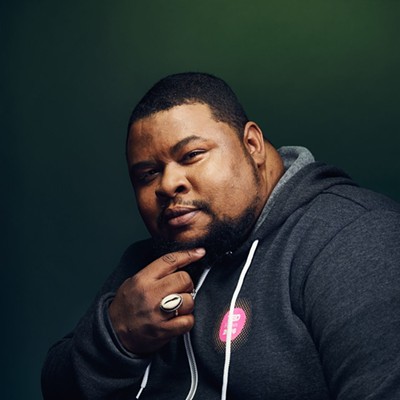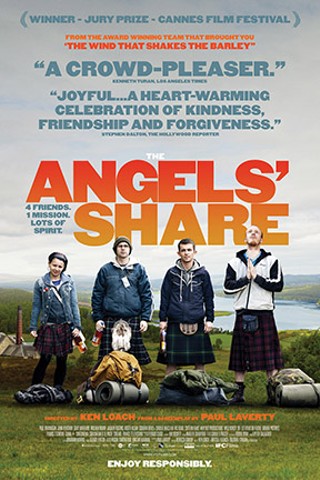During the aging process, whiskey will lose a little volume in the cask due to evaporation. That 2 percent loss, give or take, is called "the angels' share." There is also an angels' share fungus that infests distilleries in humid areas. And, sad to say, the movie that invokes the phrase as its title is more fungal than divine.
The Angels' Share is directed by Ken Loach, teaming for the 13th time with screenwriter Paul Laverty. They've worked together almost exclusively since 1996, with Laverty producing only two scripts for other filmmakers in that span. Often, their collaborations are fruitful: The Wind That Shakes the Barley was one of the better films of 2006, winning the Palme d'Or at Cannes, among other accolades; Sweet Sixteen and Bread and Roses are certainly worth investigating; and there was something apparent about Laverty's ability to enhance Loach's brand of filmmaking even in Carla's Song, their first film together.
And while a few odds and ends of The Angels' Share are still inspired, the bulk of the movie wanders, and does so to a conclusion that feels more like a reject from the happy-go-lucky Richard Curtis school (Love, Actually) than the usually noteworthy Mr. Loach.
Robbie (newcomer Paul Brannigan) is in trouble with the law yet again, but vows this time that he's a changed man. With a baby on the way, the courts show him some leniency, sentencing him to a ton of community service. His supervisor for that undertaking is a contractor and whiskey connoisseur named Harry (John Henshaw). To create a stronger bond between Robbie and his fellow parolees, Harry invites them to his flat for a whiskey tasting. Robbie has a nose for it, quite literally, and he soon finds himself in high company at one of Scotland's premier whiskey clubs.
Back at home, Robbie still struggles with leaving a life of violence and petty crime behind him. His wife forcefully clutches a short leash, and her father is even more threatening. But clean breaks are hard to come by in a dirty world, so Robbie's path out of his past is not a straight line.
Brannigan comes from a background similar to Robbie's, which is why he got the part. Loach will often cast inexperienced talent in his pictures to bring some of that realism to the screen. And it's a good choice. Even when the scenes become intense, Brannigan isn't feeling around for his boundaries and is never swallowed up by what's going on around him.
That's what makes the arc of The Angels' Share all the more puzzling. Robbie, who genuinely is trying to lead a better life, concocts a plan to commit what he believes is a victimless crime. If he and his new friends can sneak into a distillery and siphon some incredibly rare and valuable whiskey, they'll be able to sell the bottles for a tidy profit. It's the "one last heist" plot device that's been used a good 5,000 times.
You hate to say that kind of thing is "beneath" Ken Loach, but it kind of is. This is a filmmaker whose brilliant career is defined by showcasing the ills of society, and he was off to a good start by highlighting urban poverty and the tough slog to escape it. But by using such a tired cliché—and by using that same urban poverty as the engine that powers it—Loach's film comes undone.














